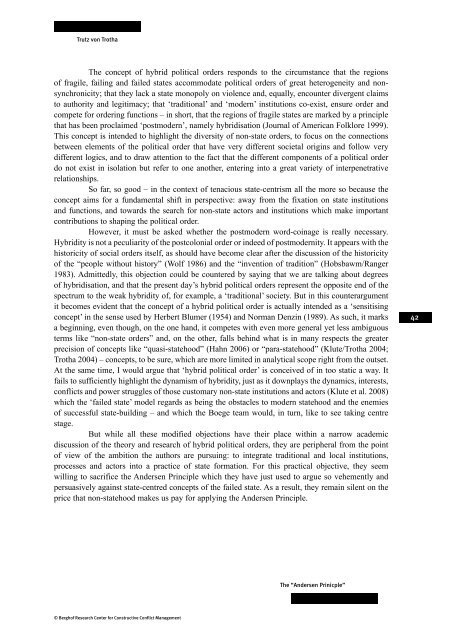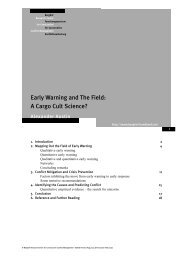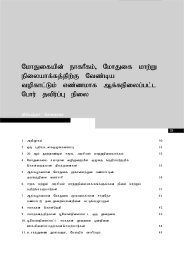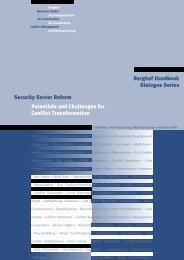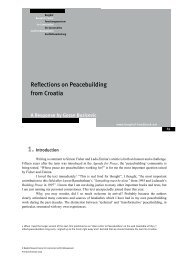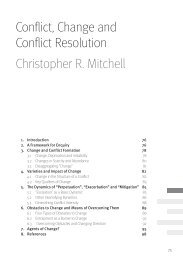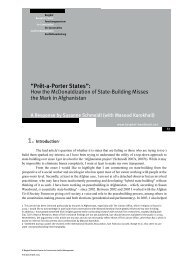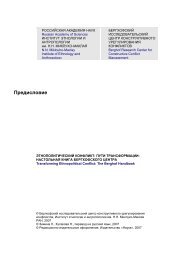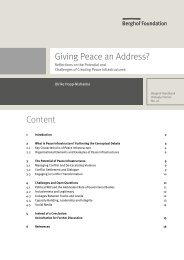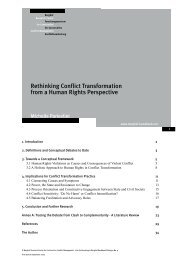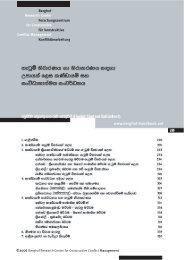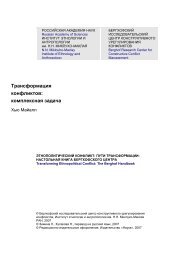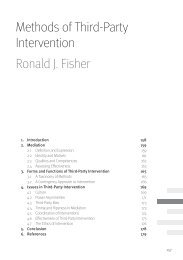Andersen Principle - Berghof Handbook for Conflict Transformation
Andersen Principle - Berghof Handbook for Conflict Transformation
Andersen Principle - Berghof Handbook for Conflict Transformation
You also want an ePaper? Increase the reach of your titles
YUMPU automatically turns print PDFs into web optimized ePapers that Google loves.
Trutz von Trotha<br />
The concept of hybrid political orders responds to the circumstance that the regions<br />
of fragile, failing and failed states accommodate political orders of great heterogeneity and nonsynchronicity;<br />
that they lack a state monopoly on violence and, equally, encounter divergent claims<br />
to authority and legitimacy; that ‘traditional’ and ‘modern’ institutions co-exist, ensure order and<br />
compete <strong>for</strong> ordering functions – in short, that the regions of fragile states are marked by a principle<br />
that has been proclaimed ‘postmodern’, namely hybridisation (Journal of American Folklore 1999).<br />
This concept is intended to highlight the diversity of non-state orders, to focus on the connections<br />
between elements of the political order that have very different societal origins and follow very<br />
different logics, and to draw attention to the fact that the different components of a political order<br />
do not exist in isolation but refer to one another, entering into a great variety of interpenetrative<br />
relationships.<br />
So far, so good – in the context of tenacious state-centrism all the more so because the<br />
concept aims <strong>for</strong> a fundamental shift in perspective: away from the fixation on state institutions<br />
and functions, and towards the search <strong>for</strong> non-state actors and institutions which make important<br />
contributions to shaping the political order.<br />
However, it must be asked whether the postmodern word-coinage is really necessary.<br />
Hybridity is not a peculiarity of the postcolonial order or indeed of postmodernity. It appears with the<br />
historicity of social orders itself, as should have become clear after the discussion of the historicity<br />
of the “people without history” (Wolf 1986) and the “invention of tradition” (Hobsbawm/Ranger<br />
1983). Admittedly, this objection could be countered by saying that we are talking about degrees<br />
of hybridisation, and that the present day’s hybrid political orders represent the opposite end of the<br />
spectrum to the weak hybridity of, <strong>for</strong> example, a ‘traditional’ society. But in this counterargument<br />
it becomes evident that the concept of a hybrid political order is actually intended as a ‘sensitising<br />
concept’ in the sense used by Herbert Blumer (1954) and Norman Denzin (1989). As such, it marks<br />
a beginning, even though, on the one hand, it competes with even more general yet less ambiguous<br />
terms like “non-state orders” and, on the other, falls behind what is in many respects the greater<br />
precision of concepts like “quasi-statehood” (Hahn 2006) or “para-statehood” (Klute/Trotha 2004;<br />
Trotha 2004) – concepts, to be sure, which are more limited in analytical scope right from the outset.<br />
At the same time, I would argue that ‘hybrid political order’ is conceived of in too static a way. It<br />
fails to sufficiently highlight the dynamism of hybridity, just as it downplays the dynamics, interests,<br />
conflicts and power struggles of those customary non-state institutions and actors (Klute et al. 2008)<br />
which the ‘failed state’ model regards as being the obstacles to modern statehood and the enemies<br />
of successful state-building – and which the Boege team would, in turn, like to see taking centre<br />
stage.<br />
But while all these modified objections have their place within a narrow academic<br />
discussion of the theory and research of hybrid political orders, they are peripheral from the point<br />
of view of the ambition the authors are pursuing: to integrate traditional and local institutions,<br />
processes and actors into a practice of state <strong>for</strong>mation. For this practical objective, they seem<br />
willing to sacrifice the <strong>Andersen</strong> <strong>Principle</strong> which they have just used to argue so vehemently and<br />
persuasively against state-centred concepts of the failed state. As a result, they remain silent on the<br />
price that non-statehood makes us pay <strong>for</strong> applying the <strong>Andersen</strong> <strong>Principle</strong>.<br />
© <strong>Berghof</strong> Research Center <strong>for</strong> Constructive <strong>Conflict</strong> Management<br />
The “<strong>Andersen</strong> Prinicple”<br />
42


